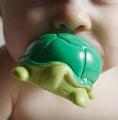 美國兩個非營利公益團體在12月4日提出訴訟,希望能強制實施國會所通過、預計2009年2月生效的「有毒玩具禁令」。
美國兩個非營利公益團體在12月4日提出訴訟,希望能強制實施國會所通過、預計2009年2月生效的「有毒玩具禁令」。
自然資源保護委員會和公民兩個團體在紐約聯邦法庭控告消費品安全委員會,試圖推翻該委員會先前所作具有法律效力的決議。該決議允許零售商儲存並且繼續銷售在2009年2月10日禁令生效日前生產的產品。
這起訴訟主要是為了保護孩童免於暴露在含有危害人體的塑料軟化劑(酸酯類化學物,phthalates)的玩具,並且防止消費者對商店販賣架上的玩具是否含有酸酯類化學物質產生混淆。原告團體聲稱。
「消費品安全委員會忽視國會,並且威脅我們下一代的健康。顯而易見的證據促使國會禁止這些玩具,部份零售商也已開始採行此一禁令。消費品安全委員會的決定完全抹煞了這些努力,他們允許禁止銷售的產品和安全的產品同時出現在商品架上。」自然資源保護委員會的科學家詹森(Sarah Janssen)說。
為了回應社會大眾對於孩童暴露於酸酯類化學物質和兒童產品含鉛量的關注,國會以壓倒多數通過消費產品安全改進法案。參議院以89比3的票數通過該禁令,而眾議院最後以424比1表決通過。該法案並於2008年8月14日由布希總統簽署通過立法。
在一封2008年11月13日發出的信函中,律師事務所福克斯(Arent Fox)代表幾家批發和零售業實體客戶,要求消費產品安全委員會只針對玩具的生產而非銷售,實施關於酸酯類化學物質和鉛的禁令。
在2008年11月17日出具的法律意見中,消費產品安全委員會總顧問法爾維(Cheryl Falvey)拒絕該律師事務所對於含鉛玩具禁令延遲執行的要求,但同意如果含有酸酯類化學物質的玩具在禁令生效日前生產,於禁令實行日之後仍可繼續販售。
福克斯辯稱如果無法販賣這些已生產製造的含鉛及酸酯類化學物質的玩具,其客戶將會遭受數以百萬美元計的營運困境,特別在現在特別艱困的經濟環境中。在其回覆中,法爾維指出消費產品安全改進法案認定鉛在聯邦危險物品法案的規範中,屬於應當禁止的危險物品。
但是這位消費產品安全委員會的律師卻說這項新法案認定酸酯類化學物為「消費產品安全標準」,而不是一種危險物品。因此,在禁令生效日前,製造商仍可囤積含有遭禁用的酸酯類化學物質的玩具和兒童照護用品,並在禁令生效一段時日之後,再將這些產品出售給消費者。
「父母們想瞭解他們購買的玩具是否安全 – 這不應該是問題。我們不能允許消費產品安全委員會在結賬通道中使顧客感到困惑。」詹森說。
酸酯類化學物質使用於許多一般消費產品中,包括孩童的玩具。當孩童吸食或咀嚼這些玩具時,這種化學物質就會被釋放出來。眾所周知,這些化學物質會干擾激素睪丸甾酮的產生,並且與生殖變異有關。
「該項法案清楚說明,把數百萬有毒的玩具出售給孩子不是處理這些產品的方式。這不僅是不道德 - 它更是不合法的。當負責保護消費者的聯邦政府機構告訴業者他們能在玩具商店架子傾倒化學廢物,這是令人感到恐怖的。」公民的國會看守部門主任阿庫什說,該部門和自然資源保護委員會一同遊說國會,倡議更強而有力的產品安全規則。
法爾維在針對福克斯律師事務所的答覆過程中宣稱,「在這封回函裡表示的意見是總顧問的立場,並未獲得委員會評論或者批准。這些意見乃基於當下所能獲得的資訊所形成。它們可能隨時由委員會或者以法律執行所替代。」
這項在美國通過的法案禁止使用在歐洲玩具中已禁用約10年的6種酸酯類化學物。其他國家,包括阿根廷、日本、以色列,和墨西哥也已禁止在孩童玩具中使用酸酯類化學物。
幾個主要的零售商先前已宣佈,他們將於2008年底將不再販售含有酸酯類化學物的玩具。
Two nonprofit public interest groups filed a lawsuit Thursday to enforce a congressional ban on toxic toys that takes effect next February.
The Natural Resources Defemse Council and Public Citizen filed the suit against the Consumer Product Safety Commission in federal court in New York seeking to overturn a legal decision by the commission that allows retailers to stockpile and continue selling the banned products as long as they were manufactured before the ban date of February 10, 2009.
The lawsuit is intended to protect children from harmful exposure to plastics softeners called phthalates in toys and prevent consumer confusion about whether toys on store shelves contain phthalates or not, say the plaintiff groups.
"The Consumer Product Safety Commission is ignoring the will of Congress and threatening our children's health," said Dr. Sarah Janssen, an NRDC scientist.
"Overwhelming evidence led Congress to ban these toys, a ban that some retailers have already started to adopt," she said. "The CPSC decision completely undermines those efforts by allowing banned toys to sit on the same shelves as the safe ones."
In response to concern about risks to children from phthalates and lead in children's products, Congress, by an overwhelming majority, passed the Consumer Product Safety Improvement Act. The Senate voted 89-3 for the ban, and the final House vote was 424-1. The bill was signed into law by President George W. Bush on August 14, 2008.
In a letter dated November 13, 2008, the law firm Arent Fox, on behalf of clients identified only as "several wholesale and retail entities," asked the Consumer Product Safety Commission to only apply the U.S. ban to the production - and not sale - of toys with phthalates and lead.
In a legal opinion published on November 17, 2008, the CPSC General Counsel Cheryl Falvey denied the law firm's request for a delay of the ban on toys containing lead but agreed that toys containing phthalates could continue to be sold after the ban date of February 10, 2009 if they were manufactured before that date.
Arent Fox argued that its clients would suffer millions of dollars worth of economic hardship, especially in these difficult economic times, if they could not sell the toys containing lead and phthalates that have already been manufactured.
In her reply, Falvey noted that the Consumer Product Safety Improvement Act identified lead as a "banned hazardous substance" under the Federal Hazardous Substances Act.
But the CPSC lawyer said the new law treats phthalates differently, as "consumer product safety standard" rather than as a hazardous substance.
As a result, manufacturers can stockpile toys and child care products with the banned phthalates right up to the date of the ban, and then sell them to consumers long after the ban was supposed to go into effect.
"Parents want to know that the toys they're purchasing are safe - it's not too much to ask," Janssen said. "We can't allow CPSC to continue this confusion at the checkout aisle."
Phthalates are chemicals used to soften plastics in many common consumer products, including children's toys. The chemicals can leach out of the toys when they are sucked or chewed. These chemicals are known to interfere with production of the hormone testosterone, and have been associated with reproductive abnormalities.
"Selling millions of toxic toys to kids is not the way to dispose of them, as the law clearly states," said David Arkush, director of Public Citizen's Congress Watch division, which, along with NRDC, lobbied Congress for stronger product safety rules.
"It's not only immoral - it's illegal," Arkush said. "It is horrifying that the federal agency charged with protecting consumers is telling the industry it can dump chemical waste on toy-store shelves."
Falvey states in her reply to Arent Fox that, "The views expressed in this letter are those of the General Counsel and have not been reviewed or approved by the Commission. They are based on the best available information at the time they were written. They may be superceded at any time by the Commission or by operation of law."
The law passed in the United States bans the same six phthalates that have been banned in European toys for nearly 10 years. Other countries, including Argentina, Japan, Israel and Mexico have also banned phthalates from children's toys.
Several major retailers have previously announced that they would remove phthalate-containing toys from their stores by the end of this year.

